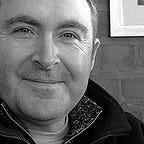Our Past, Our Future: creating new opportunities for older creatives in Hastings
Co-creating history and fictional content for a local-scale digital commons
As we crept upstairs in the calm and stillness of Hastings Museum and Art Gallery I had little inkling of the torrent of 19th century invective that Zelly, one of our creative artists, was about to unleash on me.
“I told ’em, and no mistake! We’re taking it all. We won’t leave a stitch behind us. Nothing for those buggers. We paid a fortune for this place! Our home — this business. We thought we were secure! Them and their fancy clothes, fancy words. Contracts? We signed it. Not worth the paper it’s written on…” Zelly’s voice raises to a shrill, despairing pitch.
Sound like something we’re all used to in these days of property strife across the UK? No; this is first-person dialogue from the 1830s about a family’s eviction from the America Ground in Hastings. It’s being voiced by Zelly, an accomplished writer and actor who is attending Our Past, Our Future, a month-long series of intensive creative workshops based at Hastings Museum. Zelly is one of eight to ten regulars enlivening the sessions for creatives who want to get to grips with digital and creative media, funded by The Space.
These are creative skills workshops with a difference. This programme is about working with people who might be trying to get back into work, or perhaps retired, or maybe the digital skills revolution passed them by. As well as learning new skills, and waking up old practices, we’re creating and publishing history-related stories in simple digital formats via an online map. We’re fascinated by one small but historic part of Hastings, called the America Ground.
We’re three weeks into the month of workshops; we started with hands-on archive and museum collection research at the Museum, lead by expert archivist Julie Gidlow and historical researcher at Hastings Museum, Sarah French. Julie and Sarah opened up the collections and archives, and we had three workshops looking deeply into the past.
We’re about making and creating. Digital animation workshops were led by artist and illustrator, Lee Shearman, using custom-developed phone cradles that allow stop-motion animation using mobiles and tablets at home. Roy Penfold — local social media historian and Wikimedian — opened up the world of social media history, and showed us what Facebook can and can’t do for history online.
At the heart of the project, though, is writing new stories from old. Looking back to the past, making new narratives and perspectives from our own point of view, not that of the colonial-era curator or historian. Rosanna Lowe is an inspirational storyteller and creative writing educator, and in her workshops, she’s led our creatives through daily writing exercises, encouraging everyone to read their work out loud. This is all about finding a voice: for some on our programme that’s been revelatory, for others, it’s been a slower process of re-discovery. Everyone has supported each other.
Most people who have attended so far have stayed with us, and we are now heading towards the project phase where we’ll download, record, film, animate and post-process the ideas that people are working on. Each of our creatives has developed at least two or three ideas; we’ve got poetry, short stories, animations, film ideas, and much besides. The group want to carry on meeting after the programme is over in December — that’s a great indicator for us of the success of the project.
My next task (as Creative Producer) is to transform the content ideas and core media created, and upload it to our interactive map. The map, still in beta form, was funded via an RSA Catalyst Seed Grant, and build by local developer Jon Nicholson. The historical and creative stories will be found via map icons and play on YouTube, SoundCloud, or web pages of text. Encouraged by Rob Lindsay, our producer at The Space, we’re aiming to create simple digital formats that can be found on the bigger social platforms — taking the content where the audience is.
What’s the bigger picture? I work for MSL Discover, and we’ve been experimenting with community-developed content that explores the notion of a local-scale digital culture exchange, a kind of Digital Commons for the town. To press on with this, since 2017, we’ve been running digital learning events with young people, commissioning digital arts, and working with older people, among other programming strands.
We’re keen to see what technological, networking and community needs we discover. Our Past, Our Future is the current stage of this R&D, and next up we’re planning to explore the musical history of Hastings with local musicians, looking at the revolutionary years of the post-Napoleonic era.
